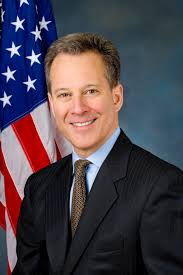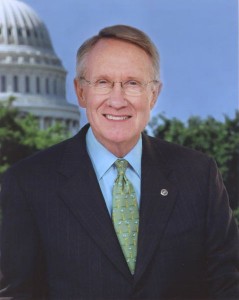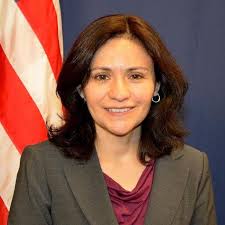Although he’s been dissed by New Jersey Gov. Chris Christie (R) and the NCAA (because his bill would allow daily fantasy sports to  include college athletes), state Sen. James Whelan (D, right) presses on in his attempt to regulate DFS as a game of skill in the Garden State. His bill would differentiate the pastime from sports betting by forbidding wagering to be predicated on the performance of single athlete, team or parlay of teams, on point spreads or the final score. Assembly Tourism, Gaming & Arts Committee Chairman Ralph Caputo (D) backs Whelan and warned DFS providers, “It’s going to be regulated, one way or the other, and it might not be the way you want.” Caputo, however, wants to wait for New Jersey’s federal appeal of its sports-betting law before taking on DFS.
include college athletes), state Sen. James Whelan (D, right) presses on in his attempt to regulate DFS as a game of skill in the Garden State. His bill would differentiate the pastime from sports betting by forbidding wagering to be predicated on the performance of single athlete, team or parlay of teams, on point spreads or the final score. Assembly Tourism, Gaming & Arts Committee Chairman Ralph Caputo (D) backs Whelan and warned DFS providers, “It’s going to be regulated, one way or the other, and it might not be the way you want.” Caputo, however, wants to wait for New Jersey’s federal appeal of its sports-betting law before taking on DFS.
Right next door, state Rep. Felix Ortiz (D) is pushing a bill that would define DFS as a game of chance. His proposal would amend New York law to define those gambling activities that are permissible under state statute. “In light of this exemption and the recent questions raised about the transparency, fairness and security of the fantasy sports companies’ data about their rosters, it is appropriate to put added consumer protections in place by giving the state’s gaming commission regulatory authority over this type of gaming,” Ortiz says.
New York Attorney General Eric Schneiderman sounds like he’s singing from the same hymnal as Ortiz when he says of DFS, “a person engages in gambling when he stakes or risks something of  value upon the outcome of a contest of chance or a future contingent event not under his control or influence.” Schneiderman’s presently got a big, courtroom showdown with DraftKings and FanDuel slated for Nov. 25.
value upon the outcome of a contest of chance or a future contingent event not under his control or influence.” Schneiderman’s presently got a big, courtroom showdown with DraftKings and FanDuel slated for Nov. 25.
Schneiderman, however, will have to square his contention that DFS is a game of chance with his charge that a miniscule group of players are dominating the winnings pool, which would seem to be an argument for the ‘game of skill’ way of thinking. He’ll also face a fired-up opponent in defendants’ attorney Randy Mastro, who accuses the AG of “irresponsible, irrational, and illegal” persecution of helpless, little DFS. (Mastro used to work for Rudolph Giuliani, so that’s where he may have inherited his penchant for high-voltage rhetoric.)
Up in Massachusetts, state officials are looking at adding DFS to the state lottery’s repertory. “We believe the introduction of a fantasy sports platform to the Massachusetts Lottery would help embrace the emerging market,” said Executive Director Michael Sweeney.
If you ask Nevada Sen. Harry Reid, DFS is neither a game of chance or skill or a lottery but just plain “unregulated, illegal  gambling.” Reid warned of “terrible things” if the DFS industry is not brought under oversight. Already the Nevada Gaming Control Board has moved beyond ordering DFS providers to be licensed to examining whether the same threshold should be applied to providers of season-long fantasy leagues.
gambling.” Reid warned of “terrible things” if the DFS industry is not brought under oversight. Already the Nevada Gaming Control Board has moved beyond ordering DFS providers to be licensed to examining whether the same threshold should be applied to providers of season-long fantasy leagues.
At least Fan Duel CEO Nigel Eccles has ceased his verbal fist-pumping and seems to realize that DFS companies really stepped in it. “To be clear, our industry needs strong, common sense, enforceable consumer protection requirements to ensure its continued growth and success,” he wrote in an open letter lauding “smart, but tough proposals in various state legislatures” for regulation. He also told Bloomberg News that FanDuel’s $100 million ad blitzkrieg may have been too much, too soon. “People, when they saw the ad for the 87th time, they thought, ‘I’m sick of this,’” Eccles conceded. Right you are, Nigel.
Bringing up the rear is Federal Trade Commission Chairwoman Edith Ramirez. She thinks the FTC is best-positioned to  oversee DFS and may well be right. But at the tortoise-like pace that Washington, D.C., is moving on the issue, we are much likelier to have a crazy quilt of divergent state regulations in place by the time the feds take action.
oversee DFS and may well be right. But at the tortoise-like pace that Washington, D.C., is moving on the issue, we are much likelier to have a crazy quilt of divergent state regulations in place by the time the feds take action.
Perhaps the most common-sense approach is that of Pennsylvania state Rep. George Dunbar (R). He would twin DFS sites with casino operators in the Keystone State. This would eliminate the most galling aspect of DFS: Its ability to operate with unregulated impunity while most of the (well-regulated) casino industry can’t offer sports wagering in any way, shape or form.
* Continuing his activist tenure, American Gaming Association President Geoff Freeman is closing ranks with the FBI. The AGA is touting the Bureau’s Internet Crime Complaint Center. It urges players to ‘drop dime’ on illegal Web casinos at www.ic3.gov.

